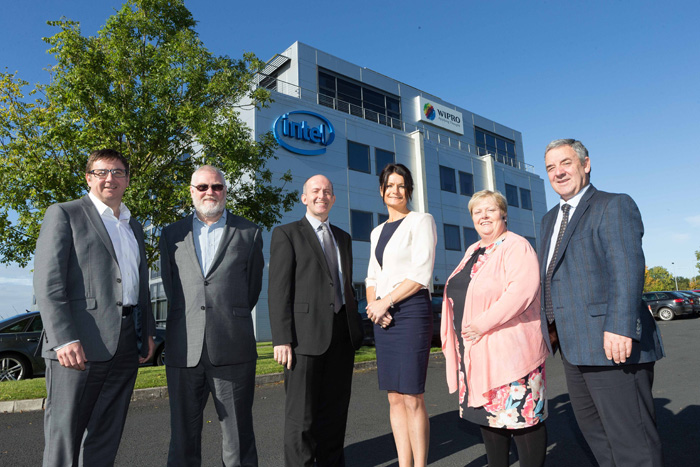
Research and Development Does not Confer Competitive Advantage in its Own Right…Shannon Chamber Seminar hears
Brian Aherne (centre) general manager, Intel Shannon and director of Intel Network Computing Division EMEA with (from left): Martin Dolan, commercial director, Modular Automation; John Barron, managing director and chairman, Reagecon Diagnostics Ltd; Helen Downes, chief executive, Shannon Chamber; Theresa O’Gorman, tax director, Grant Thornton; and Sean Burke, Enterprise Ireland at the R&D seminar held in Intel Shannon. Photo: Eamon Ward.
A diverse and dynamic workforce, which is made up of teams that span architecture, chip design, software development, product management and business development, has been at the heart of Intel Shannon’s growth and success for the past number of years.
This was the clear message from Intel Shannon’s general manager and director of Intel Network Computing Division EMEA, Brian Aherne, when he addressed a Research and Development (R&D) themed seminar held last week in Intel and organised by Shannon Chamber in association with Enterprise Ireland.
Having grown from a workforce of 15 in its early years to now employing 300 people at its Shannon facility, and regarded as a ‘core site’ in Intel’s global network, over 250 employees are directly engaged in R&D activities. Keen to attract more women to technology, Intel’s goal is to strive for parity in gender balance by 2020 in the organisation.
A number of Shannon-based SMEs – Modular Automation and Reagecon Diagnostics – also spoke at the seminar, highlighting the success that can be derived from a continued focus and investment in R&D.
However, as Modular Automation’s commercial director, Martin Dolan pointed out: “Being innovative once can be an accident; you have to repeat it to be successful.”
Modular Automation, which designs, builds and controls automated equipment for some of the world’s largest and most reputable medical device and life science companies, has proved that a focus on being niche pays dividends. The net result for the company is an ability to deliver 400 projects in the past year; 100 new development projects; and 80 Proof of Principal (PoP) projects – a process where the project is de-risked in stages.
“PoP enables us to mitigate risks up front as design flaws detected late in the lifecycle are very costly,” adds Dolan.
Injecting a note of caution, Reagecon Diagnostics general manager and chairman, John Barron stated: “R&D does not confer competitive advantage in its own right; it has to be aligned with strategy and the market and environment in which a company operates. The key part of R&D is the vision of the company, which has to be stretched, realistic and dimensional, otherwise it’s a dream,” he warned.
“Research can be positive or it can be fraught with problems,” he said, speaking from experience, having built up a business that, since 2011, has produced 21 new product lines and 2,200 new product codes to now being one of the largest producers of physical and chemical standards and reagents.
Attendees at the seminar were advised to seek guidance and assistance from Enterprise Ireland’s Horizon2020 national delegate and national contact point for SMEs, Sean Burke, when seeking to avail of funding through Horizon2020, the largest EU Research and Innovation programme ever, which has a budget of €80 billion over the next seven years, and aims to deliver excellent science, competitive industries and a better society.
Speaking after the seminar, Shannon Chamber’s chief executive Helen Downes said: “To have a company of the calibre of Intel open its doors to our members is a privilege and to be able to engage with local entrepreneurs to showcase the benefits of investing in innovation and research is quite outstanding. We have taken Grant Thornton’s tax director, Theresa O’Gorman’s advice and will be putting pressure on the Department of Finance to reassess how they allow R&D credits to companies and to appreciate that all time spent on R&D, including travel and ‘canteen thinking time’, warrants inclusion in the computation of tax credits.”
The Shannon Chamber R&D seminar was hosted as an event in the week-long national ‘Start-Up Gathering’ initiative.
